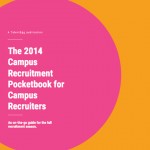When employer brands focus on work-life balance, they strengthen their position as an employer of choice with Gen Y job seekers.
That’s because employees who work in environments where their work and personal lives are respected are often more productive, focused and engaged than those who don’t.
Work-life balance has become a major focus for many employer brands, and is a leading factor influencing the career decisions of top Gen Y talent.
For students and grads pursuing a career in a dynamic industry like accounting, the realities of the profession are well established: they know there will be busy seasons and understand that overtime is often required.
Career-focused talent are excited to take on the demands of professional life, but they’re also acutely aware of the impact burnout can have on their ability to succeed in and out of the office.
Maintaining balance in life is important to Gen Y, who understand the connection between personal happiness and career prosperity. Students and grads are eager to work hard, prove their skills and grow long-term careers, and are ready to sign on with employers who will encourage and support their overall development.
In order to attract the best and brightest talent to your organization (and retain them), your recruitment messaging needs to focus on communicating how your organization supports work-life balance.
Accounting firms egg-cel at supporting and encouraging work-life balance. Take a page from their book and focus your conversations on these 4 aspects:
They talk about…
Flexibility
According to PwC’s NextGen study, 66% of Gen Y would like to shift their work hours (start their work days later, for example, or put in time at night) and 64% of Gen Y would like to occasionally work from home. Students and grads want greater flexibility than previous generations, and find accommodation to be an attractive employer trait.
Does your organization incorporate flexibility into the workplace? Flextime arrangements are a great option for students and grads who may have other commitments to work around (like professional courses or designation programs), or who may have to deal with longer commutes. Students and grads may also benefit from being able to occasionally work from different locations, like home or another office.
Other flexibility perks, like personal days, vacation structures or leave programs, give students and grads additional options for planning personal commitments or events, and indicate to top talent how highly your organization values employee time.
Case study: At Deloitte, “flexibility is key.” The firm supports work-life balance by offering flexible work arrangements to staff, as well as personal days to refresh and recharge.
They talk about…
Health and wellness
Top employers know that a healthy workforce is a strong workforce. From organic food programs to meditation spaces, workplace wellness has an impact on employees’ mental, physical, emotional, social, and spiritual welfare, as well as the company’s bottom line.
Subsidies or reimbursement programs are a huge draw for active Gen Y talent who are motivated to lead healthy, well-rounded lives. Gym memberships, sporting equipment and activity fees can be costly, and are often seen as an extra expense for many budget-conscious students and grads. If your organization offers subsidies or reimbursements for these activities, let students and grads know! This kind of investment demonstrates a commitment to their individual success, which in turn motivates Gen Y to further invest in the company’s success.
Other health and wellness perks can be found within your existing benefit package. Standard health, vision and dental coverage are already a major plus for Gen Y talent (and the rest of your team), as are customized or unique benefit packages that include services like massage therapy, acupuncture, visits with a nutritionist or naturopath.
Case study: MNP’s Total Rewards package underscores the value the firm places on work-life balance. Staff are offered a variety of benefits to help support their overall health and wellness, including a quarterly “balance subsidy” that can be used to help cover things like gym memberships.
They talk about…
Community involvement
For today’s students and grads, getting involved is an intrinsic part of everyday life. Many self-identify as well-rounded individuals and hold a variety of personal passions and interests. From arts and athletics to faith and charity, Gen Y love to feel like they are part of something.
Finding time to engage in activities or groups (which may occasionally conflict with working hours) can be a challenge for many young professionals. Successful organizations—those who are able to attract, target and recruit the best talent—are conscious of the role they play in enabling work-life balance, and actively encourage staff to pursue their community-based interests.
Paid volunteer time is an innovative way to encourage involvement. Employees are given a designated number of days per calendar year to volunteer with eligible charities. It’s a win-win: they’re given an opportunity to give back and your organization’s CSR initiatives are advanced.
Case study: KPMG’S National Experience Community Leadership program recognizes the value of community involvement, and provides students and grads the opportunity to build positive relationships and have an impact on their local, national or international communities.
They talk about…
Training and support
Professional support is integral for long-term growth and development. These initiatives foster a stronger work environment, promote individual and organizational advancement and set your employer brand apart from competitors.
Tuition support programs, which may reimburse all or part of employee education costs, are a huge draw for students and grads who are determined to advance their careers and contribute all that they can to an organization. Programs that incentivize continued education cultivate a loyal workforce of highly skilled professionals who can help drive your business forward.
Mentorship and coaching programs are another big perk for students and grads navigating the school-to-work transition. Students and grads place a lot of value on professional guidance, so knowing they’ll be paired with a buddy or mentor can help them adjust to professional life. This is especially true in an industry like accounting, where the majority of Gen Y talent entering the workforce are pursuing professional designations. Training and support programs can help ease them through the CPA PEP and CFE process and ensure they’re successful in obtaining their CPA designation.
Case study: Grant Thornton supports students and grads by providing extensive training and support throughout the CPA designation process. Coaches and mentors are assigned to staff on their first day to help prepare Gen Y for their exam.
Discussion: How does your employer brand support Gen Y’s work-life balance?






September 23, 2014 at 2:19 am
Thanks Michelle for this post. I liked it.